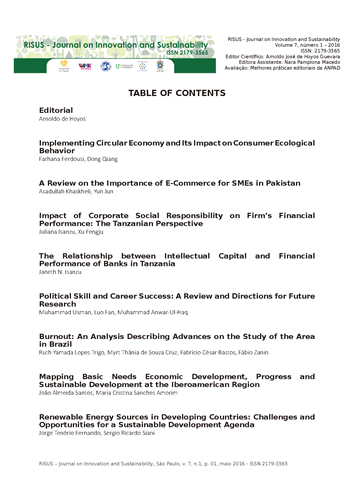Renewable Energy Sources in Developing Countries: Challenges and Opportunities for a Sustainable Development Agenda
DOI:
https://doi.org/10.24212/2179-3565.2016v7i1p64-71Keywords:
Climate change, Renewable energy, Sustainable development, Latin americaAbstract
A renewable energy matrix plays a fundamental role in providing energy services ina sustainable platform and, particularly, to reduce climate change on a global basis. However,alternative energy sources usually poses extra challenges to adopters due to higher costs, mainlyin the developing and emerging countries where: 1) basic needs still remain to be covered, and 2)top technologies, such as the required in those initiatives, are likely not to be promptly available.This article aims to verify the status of the current renewable energy sources contribution tothe regular energy systems of some countries across the Latin American region as a measureto reduce the adverse impact over the average temperature and extreme climate events. LatinAmerica, despite its vast territory and considerable availability of natural resources – which couldwell place the region in a leading position in terms of alternative energy – is still in the earlystages of having the mindset and infrastructure required to respond to the current environmentalchallenges. This exploratory study compares the database of renewable energy and climatechange drivers of some Latin American countries, seeking to verify similarities and differences,as well as the possible effect of strategies and government policies, barriers and issues in thegeneration of an energy system that support the region economic growth while following the keyprinciples of sustainability. For our research, we use Multivariate Analysis based on a large set ofavailable and updated open public indicators to establish critical areas and regional progress. Themain finding is that, if not at length comparable to the leading EU countries and other advancedeconomies in the matter, some countries in the region have been presenting important advancesto date, being able to combine economic growth to friendly-environmental practices – oftena hard equation to solve – while others, on the contrary, stay behind in sustainable practices.Most importantly, at last, is the highlight of initiatives that stand out as positive examples havinghelped mitigate the environmental burden, clearly pointing towards solutions to the challenge ofhaving sustainable development inclusive practices in the Latin American region.Downloads
Published
2016-05-02
Issue
Section
Papers
License
This Journal is licensed under a Creative Commons Attribution-Non Commercial-No Derivers 4.0 International license.
1.The author (s) authorize the publication of the article in the journal;
2.The author (s) warrant that the contribution is original and unpublished and is not in the process of being evaluated in other journal (s);
3. The journal is not responsible for the opinions, ideas and concepts emitted in the texts, as they are the sole responsibility of its author (s);
4. The editors are entitled to make textual adjustments and to adapt the articles to the standards of publication.


